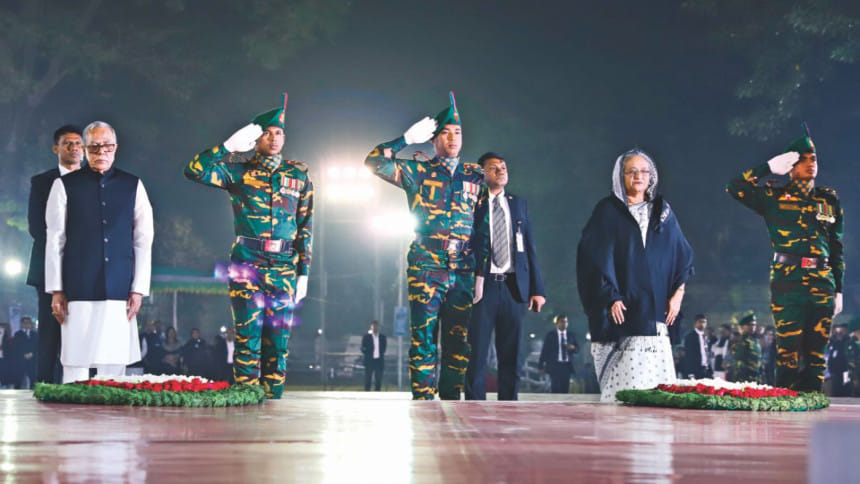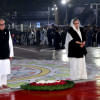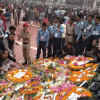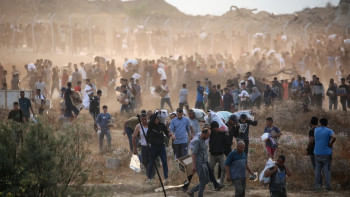Tribute to language martyrs

Just before midnight, as words to “Amar Bhaiyer Rokte Rangano”, began to waft through the air, the nation paid homage to the Language Movement martyrs.
It was a show of respect for those who sacrificed their lives for the recognition of Bangla as a state language on this day 66 years ago. They were the language heroes.
Prime Minister Sheikh Hasina arrived at the Shaheed Minar seven minutes before the clock struck 12, while President Abdul Hamid reached Central Shaheed Minar five minutes before the zero hour, reported UNB.
On his arrival, the president was received by the prime minister and Vice Chancellor of Dhaka University Prof Md Akhtaruzzaman.
As the anthem of the language day came on, the president placed wreaths at the altar at the Central Shaheed Minar, and after him came the PM. They stood in solemn silence for some time as a mark of profound respect to the memories of the language heroes.
The premier was followed by the Speaker. Flanked by cabinet members and senior party leaders, Hasina, also the president of Bangladesh Awami League, returned to place another wreath on behalf of the party. The Opposition Leader in the Parliament came next, followed by the Deputy Speaker, leaders of the Awami-led 14-party, chiefs of the three services, the IGP, attorney general, diplomats, chiefs of foreign missions, sector commanders and the Dhaka University authorities.
After them, leaders of different political parties and numerous organisations paid homage to the heroes. The premises were opened to public at 12:37am after VVIP visitors, including the president, prime minister and cabinet members, left the premises paying tribute. Barefooted, hundreds marched on to pay respects. Garbed in black and white, the words of the all-too familiar song touched their lips, a bittersweet remembrance of a momentous time.
BNP Chairperson Khaleda Zia, who, along with party leaders, used to place wreaths at the Central Shaheed Minar, is now behind bars. BNP leaders will place wreaths in the early morning, said party leaders.
A four-tier security system has been drawn up by law enforcers in and around the Central Shaheed Minar. The entire Dhaka University area is under CCTV surveillance and check posts are installed at every entry point on the campus.
Visitors have to cross multiple archways and checkpoints to enter the Shaheed Minar area.
Rab has dispatched dog squads, sweeping force, bomb disposal units, special strike force, motorcycle and car patrol teams to ensure vigilant supervision of security.
With Bangladesh, 193 countries across the globe are observing this day as Unesco declared it the International Mother Language Day in 1999.
On this day in 1952, people took to the streets in Dhaka to protest the then Pakistan government's refusal to recognise Bangla as one of the state languages and imposition of Urdu as the only official language of Pakistan.
Salam, Barkat, Rafiq, Shafiur, Jabbar and a few others were killed when police opened fire on their procession protesting the matter.
Pakistan government was ultimately compelled to include an article in the country's constitution on February 29, 1956 that declared, "The state languages of Pakistan shall be Urdu and Bengali."
To mark the day, the Central Shaheed Minar and its adjacent areas in Dhaka University wear a colourful look. Decorated with street paintings and graffiti of Bangla alphabets and verses about mother languages on the walls, entire neighbourhoods become a declaration of triumph.
In numerous other places, people will pay tribute to the language martyrs.
Today is a public holiday. The national flag will be hoisted at half-mast in all educational institutions and government, semi-government and autonomous offices to show respect to the language martyrs.
Throughout the country, people will observe the day through holding various programmes.

 For all latest news, follow The Daily Star's Google News channel.
For all latest news, follow The Daily Star's Google News channel. 








Comments